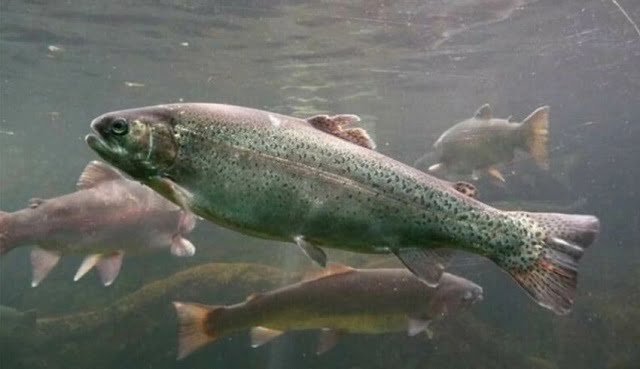
Use of functional feed ingredients, such as microalgae, has emerged as a promising strategy to improve fish health and reduce reliance on marine resources.
Microalgae, such as Chlorella vulgaris, are gaining attention as potential functional feed ingredients in aquaculture due to their beneficial properties, including immune stimulation and stress modulation.
In this regard, scientists from Kiel University, the Working Group Fish Genetics at the Research Institute for Farm Animal Biology (FBN), the Fraunhofer Research Institution for Individualized and Cell-Based Medical Engineering IMTE, the University Medical School Schleswig-Holstein, and other institutions investigated the use of Chlorella vulgaris as a functional feed additive in diets for Atlantic salmon. Their focus was on its potential to enhance growth performance, modulate digesta and intestinal mucosal microbiota, and counteract stress- and immune-related effects caused by peracetic acid (PAA) treatment.
The Study
The study, published in the scientific journal Scientific Reports, involved raising triplicate groups of Atlantic salmon in a recirculating aquaculture system (RAS) at 15°C. The fish were fed diets supplemented with 2% (CV2), 14% (CV14), or 14% once a week (CV14w) of spray-dried C. vulgaris, or a control diet (CD) for eight weeks.
Afterward, the fish were exposed to an acute one-hour treatment with peracetic acid (PAA), a commonly used disinfectant in RAS systems.
Key Findings
The study’s main findings can be summarized as follows:
- Improved Feed Efficiency and Protein Retention: Feeding Atlantic salmon diets supplemented with C. vulgaris at a rate of 14% once a week significantly improved protein retention efficiency without compromising feed conversion.
- Intestinal Microbiota Modulation: Supplementation with C. vulgaris, particularly at higher inclusion rates, altered the intestinal microbiota composition in both the digesta and mucosa. This included an increase in the relative abundance of bacteria capable of metabolizing complex carbohydrates, such as Paenarthrobacter and Trichococcus, while reducing the abundance of lactic acid bacteria like Lactobacillus and Weissella.
- Increased Stress Resilience: C. vulgaris supplementation, especially when administered weekly, reduced the transcriptional response of Atlantic salmon to peracetic acid (PAA) exposure. This suggests greater resilience to oxidative stress.
- Enhanced Antioxidant Capacity: Inclusion of C. vulgaris in the diet led to elevated levels of antioxidant enzymes such as catalase and superoxide dismutase in the gills and liver, further contributing to stress resilience.
Implications for the Salmon Industry
The findings suggest that C. vulgaris could be a valuable functional ingredient for Atlantic salmon feed. Its inclusion in diets may:
- Improve feed efficiency and protein retention.
- Modulate gut microbiota to potentially enhance gut health and nutrient absorption.
- Increase resilience to stress, particularly oxidative stress, which is common in intensive aquaculture systems.
- Support overall fish health and well-being.
Conclusion
“The study revealed that the health of Atlantic salmon can be influenced by the dietary application of Chlorella vulgaris, with the intestinal microbiota most affected by feeding 14% C. vulgaris daily, while weekly feeding seemed to enhance resilience to PAA stress,” the scientists concluded.
This study demonstrates the potential of Chlorella vulgaris as a feed supplement for Atlantic salmon, improving protein retention and transcriptional resilience to oxidative stress. The results also highlight the importance of optimizing feeding schedules for aquafeeds that promote health.
Stay Always Informed
Join our communities to instantly receive the most important news, reports, and analysis from the aquaculture industry.
However, further research is needed to optimize inclusion rates, feeding frequency, and the potential synergistic effects of C. vulgaris with other functional feed ingredients. This study provides a solid foundation for exploring the potential benefits of microalgae in sustainable aquaculture practices.
The study was funded by the Federal Ministry of Education and Research (BMBF, Germany), and open access to the article was funded by Projekt DEAL.
Contact
Jonas Mueller
Department for Marine Aquaculture, Institute of Animal Breeding and Husbandry, Kiel University
Kiel, Germany
Email: jmueller@tierzucht.uni-kiel.de
Reference (open access)
Mueller, J., Van Muilekom, D. R., Ehlers, J., Suhr, M., Hornburg, S. C., Bang, C., Wilkes, M., Schultheiß, T., Maser, E., Rebl, A., Goldammer, T., Seibel, H., & Schulz, C. (2024). Dietary Chlorella vulgaris supplementation modulates health, microbiota and the response to oxidative stress of Atlantic salmon. Scientific Reports, 14(1), 1-19. https://doi.org/10.1038/s41598-024-72531-8
Editor at the digital magazine AquaHoy. He holds a degree in Aquaculture Biology from the National University of Santa (UNS) and a Master’s degree in Science and Innovation Management from the Polytechnic University of Valencia, with postgraduate diplomas in Business Innovation and Innovation Management. He possesses extensive experience in the aquaculture and fisheries sector, having led the Fisheries Innovation Unit of the National Program for Innovation in Fisheries and Aquaculture (PNIPA). He has served as a senior consultant in technology watch, an innovation project formulator and advisor, and a lecturer at UNS. He is a member of the Peruvian College of Biologists and was recognized by the World Aquaculture Society (WAS) in 2016 for his contribution to aquaculture.







